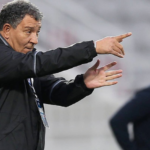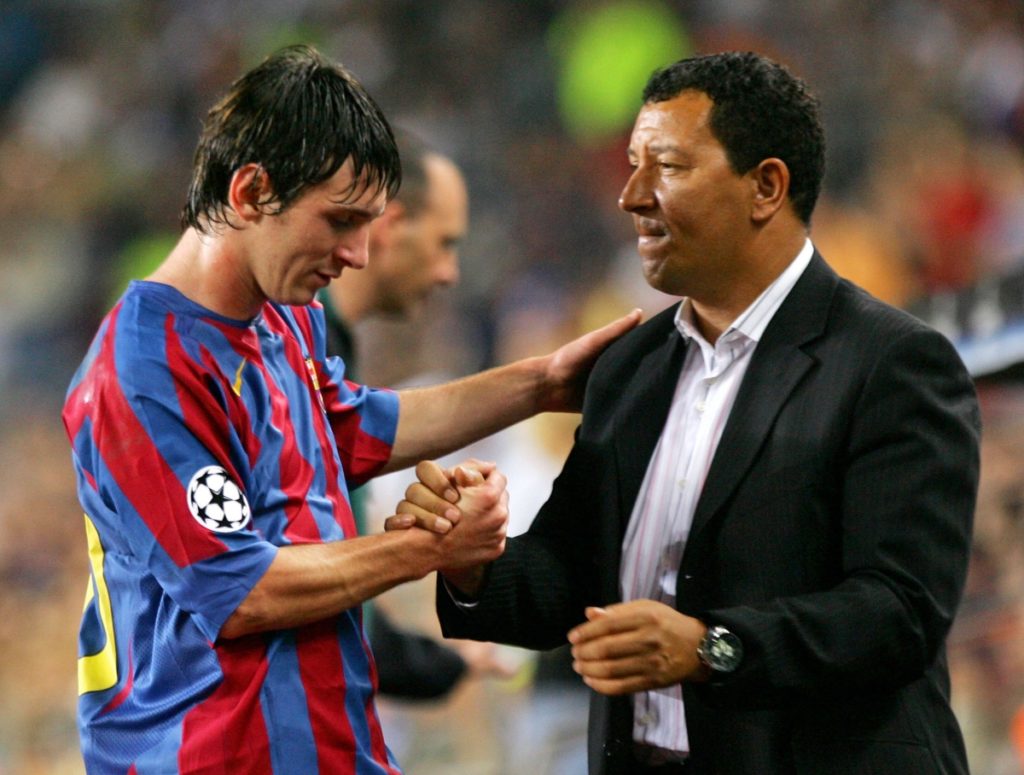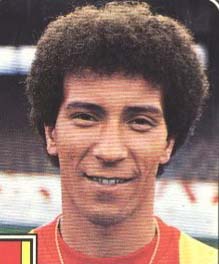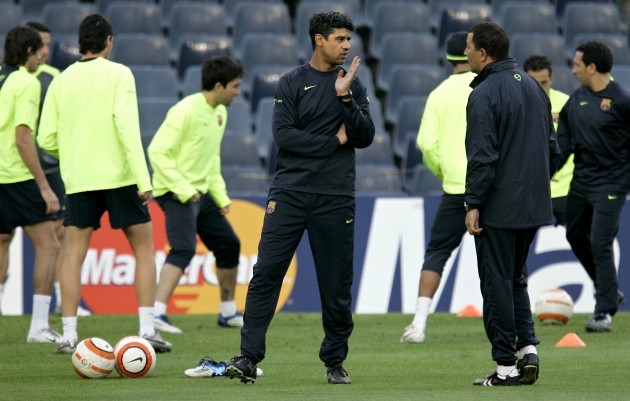In our series of posts on the vision of (young) Dutch coaches, we had upcoming coach Lijnders, the vision of Ten Hag and we’ll see more of that for sure. We also have time for an old hand. Maybe one of Holland’s best underrated coaches. Won the CL as assistant with Barcelona and has been able to look into many kitchens, on many levels. Henk ten Cate was offered the NT coaching job by Hans van Breukelen, only to see it retracted a day later. In suspicious circumstances. We covered that story. Let’s cover Ten Cate’s football vision.
To refresh your memory. Henk ten Cate started as youth player at Ajax, but never made it to the first team. He played professionally for Go Ahead Eagles and in between seasons left to play for the Edmonton Drillers in Canada. After his playing career as a winger, he started as assistant manager and later head coach of several lower level clubs, such as Go Ahead, Heracles and Sparta. At Vitesse he impressed which got him the job at Bayern Uerdingen and later MTK Budapest. He became Rijkaard’s assistant at Barca before he took the Ajax job, at the insistence of Johan Cruyff. He also was assistant coach at Chelsea. He ended up coaching in China and the Middle East where he enjoys success with Al-Jazira.
Henk ten Cate is one of the few if not only Dutch coaches who does coach a team at a World Cup. Not the 2018 Russia one, but the World Cup for club teams. His Al-Jazira made it to the semi finals where they were facing behemoth and title favorite Real Madrid. They fought like lions and even got in front, but the Madrid class won it from the exuberance of Ten Cate’s team.
Ten Cate: “I think the performance and results I got with Al-Jazira is the high point in my career re: results. I think it is underrated elsewhere, but it was really against all odds.”
You could have coached Holland at the real World Cup. Does that still hurt?
Ten Cate: “Time heals all wounds right? My biggest problem was not missing the chance to go to the World Cup. My biggest issue was with the way it was handled. The procedure, the twisting, turning and lying. And eventually, their aim to blemish my reputation. I was forced to do stuff I normally wouldn’t do, like having a reporter listen in on a conversation with Van Breukelen. Not my style, I’m very open and direct but I knew he wasn’t playing a fair game and I was right. But I won’t linger on this too much. Al-Jazira was happy it didn’t happen and shoved a new contract under my nose to sign, haha.”
Why did you want the NT coach job?
“Well, that would have been the pinnacle of my career and would have loved to have led Oranje to the World Cup. I think and still think it was possible. But, I’m not going to talk about that anymore. The KNVB wanted a different course, without me. Fine. But missing this tournament, wasn’t necessary in my view.”
Do you think this affaire has damaged your reputation at all?
“I think the technical director’s (Van Breukelen) reputation is damaged. He’s the one that left. But I think he was merely being clumsy and inexperienced. I think he might have wanted it all differently but other forces were at play. I don’t think Van Breukelen is a bad man. Out of his league. And my reputation, well… I know by now how people see me… Street fighter, etc etc. I don’t care. I do know how people in football look at me: coaches, players, ex players, world class players… I value their opinion.”
Johan Cruyff said in his authorised biograpy many positive things about you as a coach. About how you work on your teams. Piet Keizer was a fan, Willem van Hanegem is a fan. Is that valuable to you?
“Of course. These people are icons. Giants of football. And always highly critical. So praise from them is valuable and touches me. And other people can call me a streetfighter. Fine.”
How did the Al-Jazira experience develop you more as a coach?
“Us Dutch coaches, we believe we are called in to get the Dutch football culture into these clubs and teams, but that is not the case. We need to adapt when we go abroad. And I have learned to do this. I have learned here to change my philosophy. Winning ugly here is accepted. I had two massive games, where we have more than 60% possession but we lost both games. That made me think. And when I worked in China, I had a translator. The guy was a previously working for the courts, didn’t understand nada about football. So when I spoke about forechecking, he was at a loss. It ended up in a long Chinese discussion between him and the players and before I knew it, the training session was over. Crazy stuff. And coaching is all about communication. And here, with Arabs, you cannot be too direct. You cannot call them out in front of their team mates. They’ll be massively offended.”
Is the wealth and wellbeing standard of Holland a problem for the development of top players?
“I do see that young kids from immigrant families in Holland have the tendency to play outside more. Buy one football and your kids are happy all day long. Whereas more affluent families might have playstations for their kids, and computers, or access to cars etc. And football players are made on the street. Not at the club, and certainly not at the KNVB. All top athletes in the US are born in the poor parts, the gettos even. If you don’t have the money to go to college, you can get there by sports scholarships. The best boxers in England are from rough parts. But it’s not just that. I mean, Germany. They are even doing better than us, right? Their economy and wealth? And look at those talents there.”
So what is the problem?
“In Germany, discipline is taken more seriously. In school, at the homes, in football too. And the training intensity is much bigger. That weird trend in Holland, the Verheijen method, to have less intensive training, I don’t buy it. You need to push boundaries. What is wrong with players being totally buggered and empty after training? The KNVB uses that Verheijen method as a a bible, but I feel it makes us complacent. Players and coaches. But it’s not just that of course. I work according to the Foppe de Haan method and Foppe makes distinctions between stages in the competition. Verheijen creates stop watch coaches. It’s a method for insecure and inexperienced coaches. I sometimes let practices go much longer. When I see that the lads like it or are doing it really well, I keep them going. And it’s not just the physical aspect of football we need to take care of, also the mental aspect. The mind is stronger than the body. So you need to be able to gauge what is going on with a player. In his private life, is he happy, etc.”
You were one of the people interviewed for the “Winners of Tomorrow” report. Do you see anything back in the report of what you suggested?
“My contribution was on the education and development of youth players. It hasn’t become a strong report, I don’t think. It feels like they asked a number of prominent football people about their opinion, to give the world the impression they want to listen. And then they wrote it down the way they see it anyway. I had three conversations. I explained it all and in the report I read that they want kids to play 2 v 2. Why on earth? I think they need to learn to play with a team. To get them used to a form of organisation. Of course, you need individual coaching and practice, but give me a group of 15 players and I can all have them do things individually. There’s ways to it. Remember in our youth, we played bricks-football or bottle-football, on the street? Perfect practice! Every player has to protect it’s own bottle and has to score by knocking over the bottle of another player. It’s quick, it defence and offence and it teaches them about space and awareness. You can easily do this at the club! At Ajax, I had youth teams play and practice on the parking lot. The surface isn’t level. There are obstacles. Go for it! There are ways to bring the street back to the club.”
What do you miss when you see Dutch football?
“Good positioning play under pressure. There are no situations on the pitch where you have two man more. Coaches train this: 6 v 4 and 6 v 2 and 5 v 3 and all that. Nice. But in the match, it’s usually 1 v 1 and if you’re lucky 2 v 1. In matches, it’s usually 2 central defenders vs 1 striker. So I coached with 3 parts of the team. We did practices on the left channel. With a left full back, left central defender, left mid and left winger. Four players. And three opponents putting pressure on the central defender. That sort a thing. Then you need to switch quickly, either to the right or centrally, as in this scenario you will have the man more at some stage and you can move up a line. When I practice, I always simulate situations from matches. In Holland, the central backs have the most possession, they are now the passers whereas the midfielders need to get in that position. Our midfielders are not open, they position themselves with the back to the forwards. Too many balls go back to the last line of defence. They can’t see the depth, they can’t see the forwards. And then it ends up with a long ball – a hail Mary – to the striker. I think the physiological coaches, the laptop statisticians have taken over too much. In our time, we had full press and half press. That was all you needed. In half press, you play compact, you keep the lines and spaces tight. You put pressure on the ball on the side where the opponent builds up. But that’s tactics. That is step 2. You first need to build the skillset of players to position themselves properly. To be open, to be ready for the follow up. I miss that.”
We now lost Arjen Robben. Do you see a successor on the horizon?
“We destroyed that. We destroyed intuition and creativity. It’s all about the positioning now. A player that can take on two defenders and score is what wins you games. Messi, Griezmann, David Silva, Sanchez, Ziyech, Berghuis. I did a guest session as a coach at an amateur club. The players were playing Playstation football. Pass square, move, open up, turn back, pass back, etc etc. Predictable. But neat. But no surprise, no creativity. I asked their coach afterwards: What do you think? He said: Yep, went well! Then he asked me, what I thought. I said: it was terrible. All programmed. But the coach said, hey, I’m expected to win games. Play for the result. He told me that in the first four games, he let the players go and do their thing. They lost four matches and the club board summoned him in. So, result became the priority and the creativity went out of the door. On the other hand, I do know that Oranje under 17 and 19 is oozing with talent. There’s incredible talent at Ajax and AZ. You can see the Cruyff Vision now coming through, in Kluivert, Frenkie de Jong, Dolberg, De Ligt. These kids all made their debut at 17 or 18 years old.”
And then they leave for a big club….
“That’s a disaster. Ajax has a striker, Redan, who left for Chelsea. 16 years old, a super talent. But what will happen now? Like Bruma, he should have stayed at Feyenoord. This is what Stefan de Vrij did and see where it got him? De Vrij had three years experience in Feyenoord when Bruma finally started to play regularly for PSV. I even think that Dutch clubs need to let the young talents ripen at their amateur club. So he can play on the street, after school. And be with his mates. You can still sign him, but let him be for the first years. If he’s good, he’ll come to the surface anyway. So many kids that are picked up at 12 years old or younger and who are brought into that Ajax or Feyenoord Academy don’t make it. Not because they don’t have it, but because the routine is too heavy for them. I think talent is wasted this way. Not just the physical pressure, but also the mental pressure. Let them be kids.”
So leave them at the amateur level much longer?
“Yes, so they also have that push effect on the kids they play with. If all amateur clubs could keep their talents, a couple of years longer, this will push the level of all these teams up. We erode already at that age and at amateur level. These kids go to Feyenoord or Ajax and then only a handfull makes it. The rest gets deflated and is sent back to the amateurs. Most of these kids will never make it again. Players need to be tested constantly, and when you are the best of your team and you play a lot, you will not only get better but you’ll learn to be a leader.”
Our educational structure needs change?
“And that is tough to do, I get that. I think the best players from the amateurs need to be brought together in regional teams and play regional games. Maybe create a new competition. Amsterdam vs Rotterdam. Tilburg vs Breda. Utrecht vs Zwolle. Etc. City teams. Regional teams. We are developing coaches but we should be developing trainers.”








